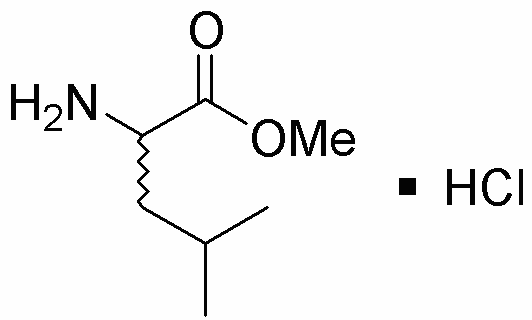DL-Leucine methyl ester hydrochloride is widely utilized in research focused on:
- Protein Synthesis: This compound serves as a building block for synthesizing peptides and proteins, making it essential in biochemistry and molecular biology.
- Pharmaceutical Development: It is used in the formulation of drugs, especially in creating compounds that enhance muscle growth and recovery, benefiting the sports and health industries.
- Food Industry: As a flavor enhancer and nutritional supplement, it is incorporated into dietary products aimed at improving protein intake for athletes and fitness enthusiasts.
- Research on Metabolic Disorders: Its role in amino acid metabolism makes it valuable for studies related to metabolic diseases, helping researchers understand and develop treatments.
- Cosmetic Applications: The compound is also explored in cosmetic formulations for its potential benefits in skin health, particularly in products targeting hydration and anti-aging.
General Information
Properties
Safety and Regulations
Applications
DL-Leucine methyl ester hydrochloride is widely utilized in research focused on:
- Protein Synthesis: This compound serves as a building block for synthesizing peptides and proteins, making it essential in biochemistry and molecular biology.
- Pharmaceutical Development: It is used in the formulation of drugs, especially in creating compounds that enhance muscle growth and recovery, benefiting the sports and health industries.
- Food Industry: As a flavor enhancer and nutritional supplement, it is incorporated into dietary products aimed at improving protein intake for athletes and fitness enthusiasts.
- Research on Metabolic Disorders: Its role in amino acid metabolism makes it valuable for studies related to metabolic diseases, helping researchers understand and develop treatments.
- Cosmetic Applications: The compound is also explored in cosmetic formulations for its potential benefits in skin health, particularly in products targeting hydration and anti-aging.
Documents
Safety Data Sheets (SDS)
The SDS provides comprehensive safety information on handling, storage, and disposal of the product.
Product Specification (PS)
The PS provides a comprehensive breakdown of the product’s properties, including chemical composition, physical state, purity, and storage requirements. It also details acceptable quality ranges and the product's intended applications.
Certificates of Analysis (COA)
Search for Certificates of Analysis (COA) by entering the products Lot Number. Lot and Batch Numbers can be found on a product’s label following the words ‘Lot’ or ‘Batch’.
*Catalog Number
*Lot Number
Certificates Of Origin (COO)
This COO confirms the country where the product was manufactured, and also details the materials and components used in it and whether it is derived from natural, synthetic, or other specific sources. This certificate may be required for customs, trade, and regulatory compliance.
*Catalog Number
*Lot Number
Safety Data Sheets (SDS)
The SDS provides comprehensive safety information on handling, storage, and disposal of the product.
DownloadProduct Specification (PS)
The PS provides a comprehensive breakdown of the product’s properties, including chemical composition, physical state, purity, and storage requirements. It also details acceptable quality ranges and the product's intended applications.
DownloadCertificates of Analysis (COA)
Search for Certificates of Analysis (COA) by entering the products Lot Number. Lot and Batch Numbers can be found on a product’s label following the words ‘Lot’ or ‘Batch’.
*Catalog Number
*Lot Number
Certificates Of Origin (COO)
This COO confirms the country where the product was manufactured, and also details the materials and components used in it and whether it is derived from natural, synthetic, or other specific sources. This certificate may be required for customs, trade, and regulatory compliance.


